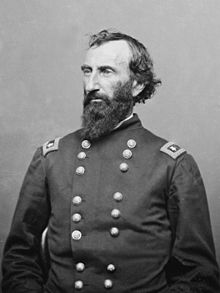
Back جون الكسندر ماكليرناند Arabic جون الكسندر ماكليرناند ARZ جان الکساندر مککلرناند AZB John A. McClernand Danish John Alexander McClernand German John Alexander McClernand Spanish جان الکساندر مککلرناند Persian John Alexander McClernand French John Alexander McClernand Italian ジョン・A・マクラーナンド Japanese
This article includes a list of general references, but it lacks sufficient corresponding inline citations. (January 2010) |
John Alexander McClernand | |
|---|---|
 | |
| Member of the United States House of Representatives for Illinois' 6th district | |
| In office November 8, 1859 – October 28, 1861 | |
| Preceded by | Charles D. Hodges |
| Succeeded by | Anthony L. Knapp |
| Member of the United States House of Representatives for Illinois' 2nd district | |
| In office March 4, 1843 – March 3, 1851 | |
| Preceded by | Zadok Casey |
| Succeeded by | Willis Allen |
| Member of the Illinois House of Representatives | |
| In office 1840–1843 | |
| In office 1836 | |
| Personal details | |
| Born | May 30, 1812 Breckinridge County, Kentucky |
| Died | September 20, 1900 (aged 88) Springfield, Illinois |
| Nationality | American |
| Political party | Democratic |
| Spouse(s) | Sarah McClernand, Minerva McClernand |
| Children | Edward John McClernand |
| Occupation | Military officer |
| Profession | Politician, lawyer |
| Military service | |
| Allegiance | United States of America |
| Branch/service | United States Army Union Army |
| Years of service | 1832, 1861–1864 |
| Rank | |
| Battles/wars | |
John Alexander McClernand (May 30, 1812 – September 20, 1900) was an American lawyer, politician, and a Union Army general in the American Civil War. He was a prominent Democratic politician in Illinois and a member of the United States House of Representatives before the war. McClernand was firmly dedicated to the principles of Jacksonian democracy and supported the Compromise of 1850.
McClernand was commissioned a brigadier general of volunteers in 1861. His was a classic case of the politician-in-uniform coming into conflict with career Army officers, graduates of the United States Military Academy. He served as a subordinate commander under Ulysses S. Grant in the Western Theater, fighting in the campaigns of Belmont, Operations on the Tennessee & Cumberland, Shiloh in 1861–62 and later briefly as a commander of the Army of the Mississippi in late 1862 to early 1863, afterwards serving as a corps commander under Grant again during the campaign against Vicksburg.
A friend and political ally of Abraham Lincoln, McClernand was given permission to muster a large force to conduct offensive operations against the confederate stronghold at Vicksburg, Mississippi, a campaign that would rival the effort of General Grant, his department commander. Grant and Halleck machinated against McClernand, and most of the troops he raised in Illinois for his expedition were instead diverted to Grant's army without his knowledge. Later on, McClernand's own expeditionary force departed southwards before his arrival, by design, commanded by General William T. Sherman, an ally of Grant. McClernand chased after his expedition southwards and assumed command, designating this expeditionary force as the Army of the Mississippi. Grant was later able to neutralize McClernand's independent effort after it conducted an expedition to capture the vital Fort Hindman on the Arkansas river, this unassuming victory had secured an important milestone in the future of the operations around the Mississippi river for months to come, and McClernand became the senior corps commander in Grant's army for the Vicksburg Campaign in 1863. During the Siege of Vicksburg, Grant relieved McClernand of his command by citing his intemperate and unauthorized communication with the press, finally putting an end to a rivalry that had caused Grant discomfort since the beginning of the war. McClernand left the Army in 1864 and served as a judge and a politician in the postbellum era.
© MMXXIII Rich X Search. We shall prevail. All rights reserved. Rich X Search